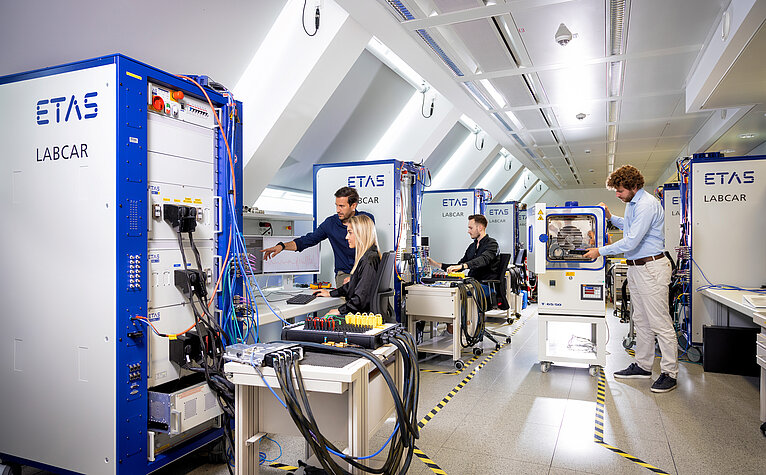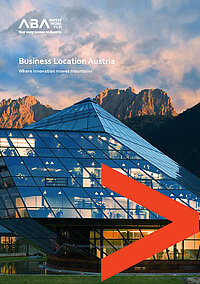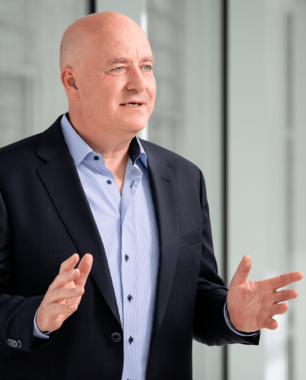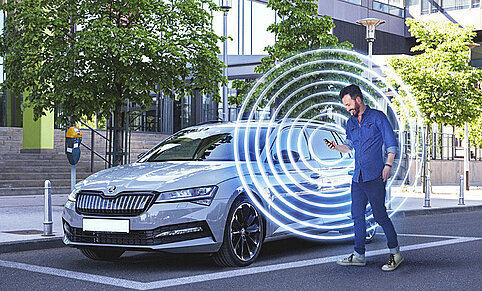 © Bosch/Höfinger
© Bosch/Höfinger
Robert Bosch AG is increasingly relying on Austria as an engineering location, most recently in the fields of automobile radar systems, artificial intelligence and electrolysis for green hydrogen.
Questions posed to Helmut Weinwurm, CEO of Robert Bosch AG and representative of the Bosch Group in Austria:
Bosch has already been present in Austria since 1899. What role does Austria play within the Bosch Group?
Austria has positioned itself as an important engineering location within the Bosch Group and one that repeatedly implements new projects which have potential for the future. For example, a team of high-frequency experts in Linz has been working on the development of so-called “Systems on Chip” (SoC) for automobile radar systems since the summer of 2021. These are highly integrated silicon chips which are only a few square millimetres in size used to control actuators in modern vehicles in real time, amongst other applications. Since the beginning of 2022, a Bosch team in Linz has also been participating in stack development work for electrolysis within the international Bosch Group. Stacks are individual electrolysis cells connected to form a single unit. This comprises the core component required in the production of green hydrogen. Within the context of intragroup competition, we score points thanks to locational advantages such as the well-educated skilled workers and the remarkable funding landscape in Austria.
In 2021, Bosch set up the new business area called “Cross-Domain Computing Solutions,” in short XC. An XC team is also located in Vienna within the international Bosch development network. Bosch is cooperating with prominent automobile manufacturers to optimise the complexity of control devices and press ahead with networking and artificial intelligence.
Do you find a sufficient pool of talents in Austria for these highly sophisticated tasks, and how would you rate Austria as a work location in an international comparison?
We are able to successfully fill all vacant positions for skilled employees. One reason is the positive reputation of Bosch and the ongoing enhancement of our attractiveness as an employer. However, we have also noticed that demand for specialists in several areas has increased, especially when it comes to software development, information technology and power electronics. For this reason, we are making every effort to be perceived as an attractive employer by the target group. In addition to cooperating with relevant universities and research centres, we also focus on ensuring an attractive and inspiring working environment for employees. In particular, we value the diversity among our employees in terms of their nationality, age and gender. International career paths are promoted. Numerous healthcare and sport offerings at the individual sites shape a dedicated team culture.
Austria stands out thanks to an exceptionally good educational system in different areas, featuring higher technical institutes, universities of applied sciences and universities. These people are highly educated and, most importantly, are available. However, even more should be done in the education sector. Since the beginning of the pandemic, we have seen how important home school and home office are, and thus the significance of digitalisation. More should be invested here. It is also important to mention that the quality of life in Austria has to be suitable in order to lure international talents for a period of three to five years. In fact, this is the case in Austria. In terms of costs, the business location is in the middle ranks.
Would you say that the collaboration of business and science is outstanding in Austria, also when compared to other countries?
Bosch mainly cooperates with technical universities and universities of applied sciences in Austria, for example the Vienna University of Technology, the Graz University of Technology, Johannes Kepler University Linz and the Josef Ressel Centre at the Salzburg University of Applied Sciences. We continuously experience this collaboration to be very professional. It is characterised by a determined, hands-on pragmatism and a ceaseless striving for a workable solution to benefit everyone involved. We also consider the communications culture to be very positive. People speak a lot to each other and frequently coordinate things in advance.
What other underlying conditions prevailing in Austria are crucial to the success of Robert Bosch AG?
It is important that Austria remains competitive by international standards. At present the inflation rate is rising, which in turn leads to high increases in staff costs. Energy prices are skyrocketing. Bosch has also established several production facilities in Austria. The above-mentioned effects negatively impact the total costs of production. By joining forces, it should be possible for political decision makers and the business community to succeed in maintaining the attractiveness of Austria as a business location in order to enable future growth.
From your point of view, how has the Austrian business location changed over the years and decades? What has improved and what do you think was better in the past?
The good education system in Austria along with macroeconomic stability, legal certainty and the overall infrastructure are definitely positive factors. Furthermore, diversity with respect to gender, nationality, age and education has enormously increased in the field of engineering. Today we work together in mixed teams.
Were there any particularly formative or significant events, turning points or personal experiences in the corporate history of the Austrian facility which you vividly remember?
The coronavirus pandemic and the outbreak of war in Ukraine were completely unexpected and sudden events. At Bosch we mastered the coronavirus crisis very well in spite of all the ensuing challenges. For me personally, the war in Ukraine is a very distressing event because I have made numerous friends in Ukraine and Russia due to my professional work spanning many years. From the very first day, it has been important for me and everyone here at Bosch to provide extensive humanitarian assistance very quickly.
Gratifyingly, there are several positive turning points to mention concerning Bosch in Austria. We have repeatedly succeeded in attracting additional engineering projects within the Bosch Group to Austria. For example, the Viennese facility is seen as an established competence centre for hardware and software solutions for all kinds of drive systems in passenger cars as well as for electric-powered, hybrid and fuel cell vehicles and for Internet-of-Things solutions in the field of networked mobility. The development of solutions for new electronic architectures in vehicles represents a new addition to Vienna’s portfolio. At the Bosch Engineering Center in Linz which originally developed common rail systems for utility vehicles, work is being done today on injection valves for large gas engines, hydrogen tank valves and data analysis services supported by artificial intelligence for product development purposes. Moreover, the Linz site is focusing on so-called Systems on Chip (SoC) which, for example, can control actuators in real time. The Bosch facility in Hallein develops systems for exhaust gas after treatment in utility vehicles (Denoxtronic) along with injection systems for large engines used in transport ships and locomotives, amongst other applications. Work is also being done on injection systems using alternative fuels.
What are the next steps which Bosch plans to implement in Austria? Can you already tell us anything about this today?
Bosch is making investments in future technologies all across the globe and we are proud that Austria is also making a meaningful contribution towards the development of new Bosch solutions. Bosch in Austria is focusing on the issue of hydrogen as well as pressing ahead with innovations for electrified vehicle drives as well as future-oriented solutions for the networked vehicle and autonomous driving. Accordingly, engineers at Bosch in Austria are not only working on fuel cell systems but also on compressor systems for hydrogen fuelling stations and hydrogen tank valves for refuelling and removal of the hydrogen. A Bosch team in Linz has also been participating in stack development work for electrolysis within the international Bosch Group. Stacks are individual electrolysis cells connected to form a single unit. This comprises the core component required in the production of green hydrogen.
Do you have any wishes for the Austrian business location or Austrian Business Agency?
Austria is well positioned as a business and development hub. Austria should adjust even more quickly to changing conditions, for example when it comes to speeding up official procedures and creating framework conditions with an openness to technology so that the best solutions prevail. Sufficient funding is necessary to get involved in future fields at an early stage.
We hope ABA will continue the professional support and outstanding cooperation which we are accustomed to.
How has ABA supported Bosch?
ABA has been a reliable partner for us for years when it comes to providing support on strategic projects thanks to their comprehensive expertise, extensive network and in-depth know-how.
And finally, one last question: what do you personally value the most about Austria?
Austria is an absolutely beautiful country which has quite a lot to offer culturally, athletically and in terms of its culinary delights. There are very warm-hearted people here and my family also lives here. Many people love to come to Austria on vacation, whereas I have the privilege of working and living here.
Robert Bosch AG
Robert Bosch AG, Vienna, was founded in 1983. In 1990, the company was acquired by Voest-Alpine Automotive GmbH, which had operated development departments in Vienna, Linz and Hallein. Over the next decades Bosch consistently and successfully expanded its engineering activities in Austria, particularly due to the availability of highly qualified technical employees. Today Bosch is represented in Austria by all its four operating areas of Mobility Solutions, Industrial Technology, Consumer Goods as well as Energy and Building Technology. About 3,000 employees work for Bosch in Austria, of whom 1,000 are involved in research and development. Bosch operates international development competence centres for mobility technology at its facilities in Vienna, Linz and Hallein, which in part set the pace for innovation within the Bosch Group. Software and hardware solutions for all types of drive systems in passenger cars as well as for electric-powered, hybrid and fuel cell vehicles and networked mobility are developed in Vienna. Moreover, a “Cross-Domain Computing Solutions” team is focusing on new electronics architectures in vehicles. The Linz site develops common rail systems for utility vehicles as well as injection valves for large-sized gas engines. Data analysis services for project development are implemented with the help of artificial intelligence. Furthermore, the facility is pushing ahead with hydrogen projects such as the so-called “Systems on Chip” (SoC) which can, for example, control actuators in real time. The Hallein site develops systems for exhaust gas after treatment in utility vehicles (Denoxtronic) along with injection systems for large engines used in transport ships and locomotives, amongst other applications. Work is also being done on injection systems using alternative fuels.
More Success Stories
ABA Help Desk
Let's talk

Top Download Invest

- Top infrastructure & central location
- Stable framework conditions
- Supportive environment for innovation

